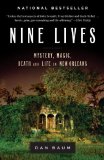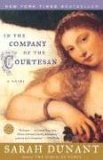Summary | Excerpt | Reading Guide | Reviews | Beyond the book | Read-Alikes | Genres & Themes | Author Bio

From the book jacket:
Venice, a city steeped in a thousand years
of history, art and architecture, teeters in
precarious balance between endurance and
decay. Its architectural treasures
crumble—foundations shift, marble ornaments
fall—even as efforts to preserve them are
underway. The City of Falling Angels
opens on the evening of January 29, 1996,
when a dramatic fire destroys the historic
Fenice opera house. The loss of the Fenice (pronounced fay-nee-CHAY),
where five of Verdi's operas premiered, is a
catastrophe for Venetians. Arriving in
Venice three days after the fire, Berendt
becomes a kind of detective—inquiring into
the nature of life in this remarkable
museum-city—while gradually revealing the
truth about the fire.
Berendt tells a tale full of atmosphere and
surprise as the stories build, one after the
other, ultimately coming together to reveal
a world as finely drawn as a still-life
painting. The fire and its aftermath serve
as a leitmotif that runs throughout, adding
the elements of chaos, corruption, and crime
and contributing to the ever-mounting
suspense of this brilliant book.
Comment: There are countless books
written about Venice but, arguably, none
written by an author as familiar to readers
as John Berendt, whose first book,
Midnight in the Garden of Good and Evil
(1994), stayed on the New York Times
bestseller list for four years and, thanks
in part to the 1997 movie of the same name,
achieved a fair degree of awareness outside
of the USA as well.
Every author hopes that his/her book will
make it on to the bestseller lists, but few,
even in their wildest imaginations would
dare to consider a four year run for their
first book. However, such success is
something of a double-edged sword as it sets
very high expectations for what
follows. Berendt has taken 11 years to
publish his second book, and many were
watching and waiting to see if it could live
up to the success of the first.
On the whole, the verdict is yes, it does:
The Washington Post concludes that it's
"precise, evocative and witty", Library
Journal sums up with one word: "Essential",
and Kirkus Reviews gives it a starred
review, saying he does "great justice to an
exalted city", while also commenting that he
makes the occasional wrong turn (such as
lingering far too long over the apparent
suicide of a local gay artist, for example).
The final word goes to Booklist who sum up
their review saying, "This is journalism at
its most accomplished; it is creative
nonfiction as enveloping and heart embracing
as good fiction".
![]() This review was originally published in The BookBrowse Review in November 2005, and has been updated for the
November 2006 edition.
Click here to go to this issue.
This review was originally published in The BookBrowse Review in November 2005, and has been updated for the
November 2006 edition.
Click here to go to this issue.

If you liked The City of Falling Angels, try these:

Nine Lives: Mystery, Magic, Death, and Life in New Orleans
by Dan Baum
Published 2010
Nines Lives is a multivoiced biography of a dazzling, surreal, and imperiled city, told through the lives of nine unforgettable characters and bracketed by two epic storms.

In The Company of the Courtesan
by Sarah Dunant
Published 2007
A story of desire and deception, sin and religion, loyalty and friendship that paints a portrait of one of the world's greatest cities, Renaissance Venice, at its most potent moment in history.
When a true genius appears in the world, you may know him by this sign...
Click Here to find out who said this, as well as discovering other famous literary quotes!
Your guide toexceptional books
BookBrowse seeks out and recommends the best in contemporary fiction and nonfiction—books that not only engage and entertain but also deepen our understanding of ourselves and the world around us.